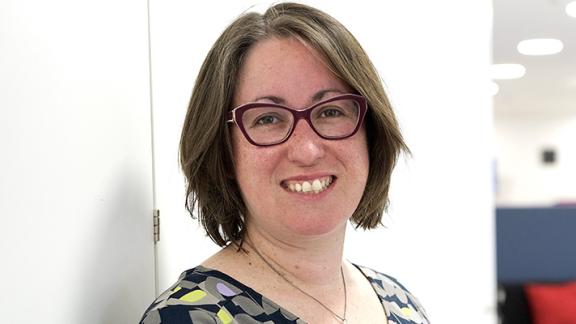We need the support of our allies to improve LGBTQ+ inclusion

The theme of this year’s LGBT+ History Month is activism and social change – and a key part of this for me is the active support of allies to help improve inclusion and belonging across healthcare. Our Health and Care LGBTQ+ Leaders Network has been looking at ways to better understand the experiences of both LGBTQ+ staff, and those who wish to support their LGBTQ+ colleagues.
A few months ago, we surveyed our members to gather insight into their experiences of discrimination in the workplace in our largest ever network survey. Over 540 members responded, with 78 per cent identifying as LGBTQ+ and the remaining 22 per cent as allies.
We defined allies as members of the Health and Care LGBTQ+ Leaders Network who do not identify as LGBTQ+ but have an active interest in progressing LGBTQ+ inclusion and equality. Unlike many other temperature checks of healthcare staff, we asked respondents whether they had witnessed discrimination and how this was responded to when reported. The responses give us some interesting insights.
Higher rates of discrimination witnessed
When we asked LGBTQ+ staff about whether they had experienced and/or witnessed discrimination at work, we found that many had. 25 per cent of LGBTQ+ respondents had experienced direct or indirect homophobia within the preceding 12 months, nearly double the rate reported in the NHS Staff Survey.
But I was particularly concerned that 31 per cent of staff had witnessed LGBTQ+ discrimination. This is moving towards three times the level disclosed in the most recent NHS Staff Survey (an average of 12.5 per cent across discrimination from staff and patients).
20 per cent of LGBTQ+ staff who were surveyed reported experiencing direct or indirect transphobia in the preceding 12 months; 44 per cent witnessed it. This is over double the amount of transphobia witnessed that was reported in the NHS Staff Survey (an average of 18 per cent across discrimination from staff and patients).
“31 per cent of staff had witnessed LGBTQ+ discrimination. This is moving towards three times the level disclosed in the most recent NHS Staff Survey.”
So what does this tell us? Obviously our survey is much smaller than the NHS Staff Survey – and our network members were likely more willing to disclose experiencing and witnessing LGBTQ+ discrimination. However, our survey shows that not only is there potentially a lot more discrimination happening in the healthcare sector than is being captured in the NHS Staff Survey; it’s clearly happening out in the open for many to see.
This is concerning: research is clear that experiencing or witnessing discrimination has a profound impact on whether staff feel safe to come to work, can deliver in their roles and ultimately thrive at work.
Disparity in experience
When we explore the data further, there’s another interesting disparity between LGBTQ+ staff and allies. 31 per cent of LGBTQ+ respondents shared that they had witnessed homophobia, compared to 27 per cent of allies. 44 per cent of LGBTQ+ respondents witnessed transphobia, compared to 30 per cent of allies.
"Experiencing or witnessing discrimination has a profound impact on whether staff feel safe at work, can deliver in their roles and ultimately thrive.”
These results suggest that compared to allies, LGBTQ+ people are either coincidentally exposed to more homophobia and transphobia directed at others at work, or perhaps allies are not always aware of the extent of homophobia and transphobia taking place; it can sometimes be subtle.
Plus, allies are significantly more likely to think their organisation responded appropriately to such incidents compared to LGBTQ+ respondents. When we asked allies if they thought their organisations responded appropriately when homophobic or transphobic incidents were reported, 31 per cent thought they did.
That’s a concerningly low proportion. But our survey found that only 18 per cent of LGBTQ+ staff thought their organisations responded appropriately to homophobia, and only 13 per cent responded appropriately to transphobia.
Knowing when to hold leadership to account
The survey showed widespread concerns about how discrimination is dealt with in the NHS. It also reveals a clear disparity between how LGBTQ+ staff experience and witness discrimination and how they feel about the organisation’s response, compared to the views of those NHS staff who are so invested in improving their LGBTQ+ colleague’s experiences that they belong to our network.
"When allies are educated on what discrimination looks like, they will be more able to spot and call out inappropriate behaviour.”
We can learn from this gap – it tells us that the prevalence of LGBTQ+ discrimination in the NHS may be underestimated by wider NHS staff and leadership. Organisational responses may be less adequate than assumed and could be improved if we want to deliver safer and more trusting workplaces where staff can thrive.
When allies are educated on what discrimination looks like for different marginalised groups, they will be more able to spot and call out inappropriate behaviour. This highlights how essential it is to have a clear view on what constitutes an appropriate organisational response to discrimination, alongside transparent communication channels. This will help and support allies in knowing when to further hold their leadership to account for the protection of all staff.
The steps you can take as an ally
LGBT+ History Month is a timely moment for allies to listen, progress further into their learning journeys around LGBTQ+ people’s experiences, and fully understand what good looks like when an organisation responds to discrimination. This will of course benefit everyone who works in our vital sector.
As an ally and someone who is keen to learn more, what steps can you take? If you haven’t already, we encourage you to join our Health and Care LGBTQ+ Leaders Network which is open to allies. I’d also encourage you to find out more about your organisation’s LGBTQ+ staff network if you have one and consider joining as an ally.
You can also access our Health and Care LGBTQ+ Inclusion Framework; a practical guide which supports leaders and staff to create inclusive environments for LGBTQ+ staff and service users. We are planning to launch a new resource hub later this month with practical guidance on all things LGBTQ+ inclusion – sign-up to our network bulletin so that you can hear about this resource in the coming weeks.
The NHS Employers Diversity in Health and Care Partners Programme also helps organisations develop more inclusive workplace cultures. You can register your interest to join the 2025/2026 cohort now.
Dr Layla McCay is director of policy at the NHS Confederation and executive lead of the Health and Care LGBTQ+ Leaders Network. You can follow Layla on Bluesky.



